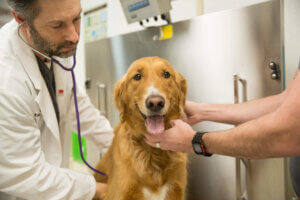Mon, Tues & Thurs: 8:30AM – 7:00PM
Wed & Fri: 8:30AM – 5:00PM
Sat: 8:30AM – 1:30PM
Sun: Closed
Wed & Fri: 8:30AM – 5:00PM
Sat: 8:30AM – 1:30PM
Sun: Closed
Mon, Tues & Thurs: 8:30AM – 7:00PM
Wed & Fri: 8:30AM – 5:00PM
Sat: 8:30AM – 1:30PM
Sun: Closed
Wed & Fri: 8:30AM – 5:00PM
Sat: 8:30AM – 1:30PM
Sun: Closed
Blog
Keep Your Pet Healthy With Our Blog

Canine Respiratory Illness
December 21, 2023
Should you be concerned about respiratory illness in your dog? A mystery canine respiratory illness has been spreading across the nation with occurrences reported in

Making Sure They Always Come Home – Microchipping
July 1, 2018
It is every pet owner’s worst fear – finding out that your beloved pet is lost and nowhere to be found.

Is Anxiety Ruining Your Pet’s Summer?
May 31, 2016
Summer brings celebrations that often feature fireworks, explosions, and gunshots, but these things are frequently scary for our pets, who don’t understand the loud noises and bright flashes.

Lyme Disease Prevention
July 1, 2018
Just like humans, dogs are susceptible to Lyme disease, and can have long lasting issues from contracting this disease.

